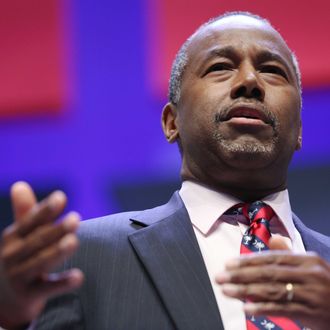
When Ben Carson said over the weekend that he doesn’t think a Muslim should be president, he couched his argument in language you’ve probably heard before: He suggested that Islam is “inconsistent with the values and principles of America.” This is not a new sort of claim — it isn’t hard to find people making versions of it all over the place, whether the argument is about American Muslims or migrants in Europe.
The basic idea is that some fundamental aspect of the Koran or, more broadly, “Muslim culture” (which doesn’t really mean anything since there are so many different varieties of Islam, and they’re dispersed over such a wide geographic range), just doesn’t mesh well with human rights or democracy or [insert other good thing]. These arguments take a really large group of people and assume, by virtue of their religious identification, they’re incapable of certain beliefs (thinking governments should elected by the people), behaviors (abiding by rules protecting women’s rights), or both.
The problem is that this is a severe oversimplification of the relationship people have with their religion, of what it means to be a believer. I emailed Scott Atran, a leading scholar on religion, political violence, and terrorism, to ask about this: Don’t people pretty clearly compartmentalize their religious beliefs in a way that means they can simultaneously “believe” in a book that says one thing, but live their lives in a way that embraces or tolerates conflicting values?
His response:
It’s not just that people compartmentalize religious belief — obviously Catholics that celebrate mass and ritually partake in tokens of the blood and body of Christ are not everyday cannibals — but more important, religious belief is what people make of it, how they themselves interpret it. People make religion, and the hallmark of religions, especially the abrahamic and other universal religions like Buddhism, in that their interpretation and inspiration is never fixed even if some of the words are (and besides, core religious utterances are, unlike most other types of statement, inherently open-textured and continuously demanding of interpretation by other words and thoughts because, literally, they are empirically or logically impossible: Mohammed ascending to heaven on his steed from a rock in Jerusalem, or God is one in three).
My opinion of Ben Carson just went down another notch.
Justin Barrett, a religion scholar at the Fuller Theological Seminary, pointed out that Carson (a Seventh-day Adventist who talks openly about his faith), was glossing over a great deal of similarities between Islam and Christianity. “It is likely that most Christian traditionalists in America have more in common concerning foundational values with Muslims than they do with progressives,” he said. “Differences are real between people of various faiths and ethnicities, but they often mask deeply important similarities, and variation within a group may be greater than differences between the groups.”
Religions get interpreted in different ways by their adherents. Different religions, especially those with the same “ancestry,” have a lot in common. These aren’t complicated points, but they’re incompatible with the goal some people have of making Muslims out to be as different and scary as possible.




